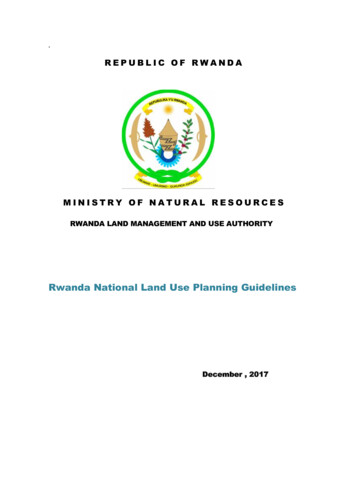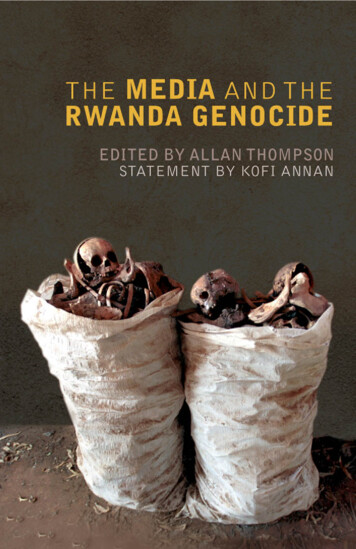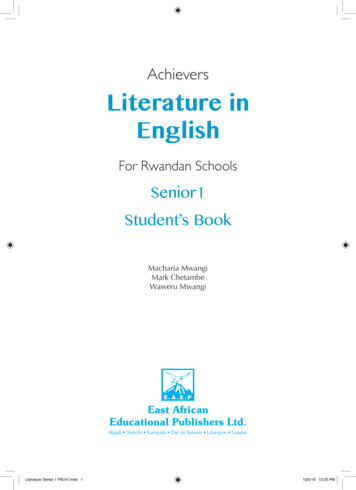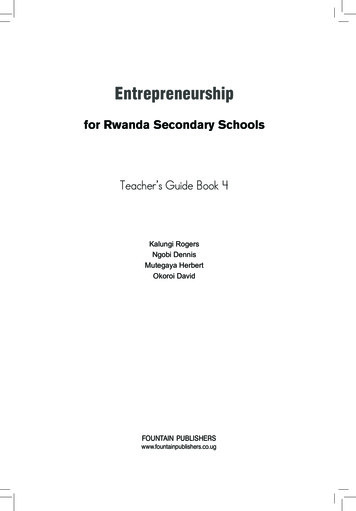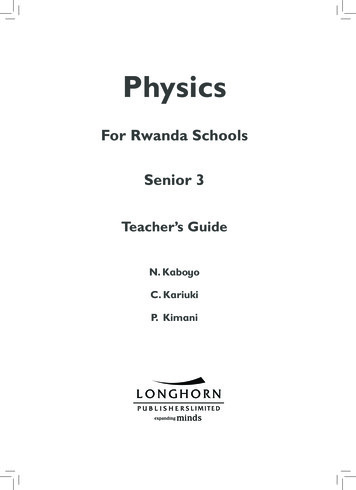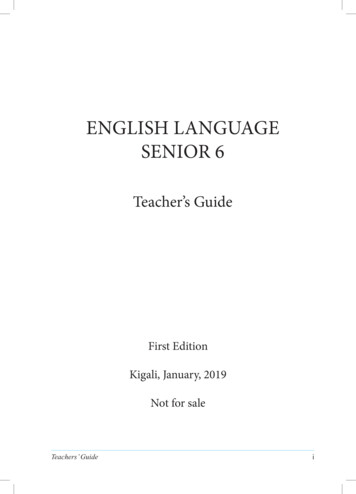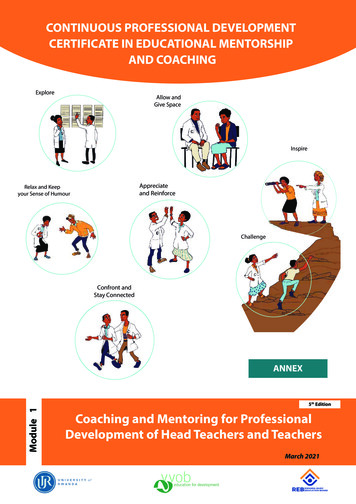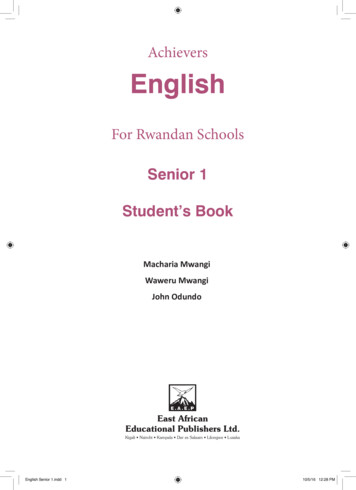
Transcription
AchieversEnglishFor Rwandan SchoolsSenior 1Student’s BookMacharia MwangiWaweru MwangiJohn OdundoKigali Nairobi Kampala Dar es Salaam Lilongwe LusakaEnglish Senior 1.indd 110/5/16 12:28 PM
Published byEast African Educational Publishers Ltd.Kijabe Street, NairobiP.O. Box 45314, Nairobi – 00100, KENYATel: 254 20 2324760Mobile: 254 722 205661 / 722 207216 / 733 677716 / 734 652012Email: eaep@eastafricanpublishers.comWebsite: www.eastafricanpublishers.comEast African Publishers Rwanda Ltd.Tabs Plaza, 2nd Floor, Room No. 12. Kimironko Road,Opposite Kigali Institute of Education, KigaliP.O. Box 5151, Kigali, RWANDATel: 250 787 309702 / 722 562101Email: eap@eastafricanpublishers.comEast African Educational Publishers also has offices or is represented in the following countries: Uganda, Tanzania,Rwanda, Malawi, Zambia, Botswana and South Sudan. Macharia Mwangi, Waweru Mwangi, John Odundo, 2016First published 2016Reprinted 2016All rights reservedISBN: 978-9966-56-166-4Printed in Rwanda byPrintex LimitedEnglish Senior 1.indd 210/5/16 12:28 PM
ContentsUNIT 1: MY SECONDARY SCHOOL. 2A. Listening and speaking.2B. Reading and comprehension.5C. Language use.7The present simple tense.7D. Writing.11Descriptive writing . 11Describing places and objects.11Describing a person. 12E. Little laughter.12UNIT 2: FOOD AND NUTRITION. 16A. Listening and speaking . .16Foods.18B. Reading and comprehension.18C. Language use.21Simple present tense.21Relative pronouns. 22Adverbs of frequency.24Countable and non countable nouns.25. Determiners of quantity . 26D. Writing.28Recipe .28E. Little laughter.29UNIT 3: HOLIDAY ACTIVITIES. 31A. Listening and speaking.31Talking about holiday activities.31B. Reading and comprehension.33C. Language use.35Adverbs of frequency/time and duration.35Past simple tense .37Present simple tense with future meaning.39D. Writing.40Describing fixed holiday plans.40English Senior 1.indd 310/5/16 12:28 PM
Brochure.41Group project.41E. Little laughter.41UNIT 4: CLOTHES AND FASHION. 43A. Listening and speaking.43Role-play .45Debate.46B. Reading and comprehension.46C. Language use.48Present continuous tense.48Adjectives for describing clothes.50D. Writing.50Descriptive writing. 50E. Little laughter.51UNIT 5: BOOKS AND SCHOOL WORK HABITS.53A. Listening and speaking.53Reading Books . .54B. Reading and comprehension.56Confessions of an AIDS victim.56C. Language use.58Present perfect tense.58D. Writing.60Essay writing .60Planning your writing.61Beyond the barricades.61E. Little laughter.62UNIT 6: HEALTHY LIVING. 64A. Listening and speaking.64Practise reading this conversation in your groups.64Role and play . .66B. Reading and comprehension.66Healthy diet for disease prevention.66C. Language use.68First conditional and modal verbs.68D. Writing . 71English Senior 1.indd 410/5/16 12:28 PM
Research problem. 71E. Little laughter.71UNIT 7: HISTORY OF RWANDA.73A. Listening and speaking.73B. Reading and comprehension .74C. Language use .77Past simple tense.77Adverbs of time.78Time clause with past simple tense.78Time clause with past continuous tense.79Adverbials of time past simple tense .81D. Writing.81Biography.81E. Little laughter.82UNIT 8: THE PHYSICAL ENVIRONMENT. 84A. Listening and speaking.84B. Reading and comprehension.87C. Language use .88Passive voice with ‘can’.89Passive voice with modal verbs and comparatives.90Passive voice with modal verbs and superlatives.91Comparatives and superlatives.91Comparing rainfall. 92D. Writing.93E. Little laughter.93UNIT 9: ANTI-SOCIAL BEHAVIOUR. 95A. Listening and speaking.95Debate the topic.97B. Reading and comprehension.97C. Language use.98Using connectors, adjectives and glish Senior 1.indd 510/5/16 12:28 PM
D. Writing.101Working in your groups.101Group project.101E. Little laughter.101UNIT 10: SOURCES OF WEALTH.104A. Listening and speaking.104B. Reading and comprehension.106Overview of resources in Rwanda.106C. Language use.108Passive voice, present tense and connectors of time.108Describing a process.109D. Writing.110Tables and graphs.110E. Little laughter.110UNIT 11: REVISION EXERCISES.114A.B.C.D.Listening and speaking.114Reading and comprehension.115Language use.118Writing.121GLOSSARY. 122REFERENCES. 124English Senior 1.indd 610/5/16 12:28 PM
Topic area:ORAL AND WRITTEN COMMUNICATIONMy secondary schoolKey unit competence:To use language learnt in the context of my secondary school.Number of lessons: 201English Senior 1.indd 110/5/16 12:28 PM
Unit1A.MY SECONDARY SCHOOLListening and speakingIntroductionIn the following conversation, Kajuga and Uwase are new Senior 1 students atAmahoro Friends Senior School. Read the conversation aloud in A:Hello, Uwase.Hello, Kajuga.I’m happy to see you. I never thought I’d see you again after our days at HopePrimary School. Congratulations on passing with flying colours.I’m happy to see you too. It is so exciting to be here. I am a bit frightenedthough.I understand. Many new students feel that way sometimes. However, youfeel better after awhile. Tell me, do youstill love Agriculture?EnglishIt is offered here, youknow.MathematicsYes, I do. I like itbecause we practiseBiologyit every day at home.We prepare thePhysicsland for the plantingseason. We also lookGeographyafter animals like cowsand goats. I love thatHistorysubject. I love Mathtoo. I am told thisEconomicsschool offers Physics. Iwould like to study it.AgricultureYes, they do. We havefour physics lessonsevery week. You might2English Senior 1.indd 210/5/16 12:28 PM
UWASE:KAJUGA:UWASE:KAJUGA:end up as an engineer. Personally, my favourite subject is History. I read itevery day. I would like to be a lawyer or historian. I love English too. I practisepublic speaking in the evenings. I know I will meet and address many artlovers.How many English lessons do you have in a week?We have five of them in a week.I must take them too. After all, other subjects are taught in English. I am gladwe are talking. I feel more confident. Thank you.You are welcome.The conversation that you have just read is about the subjects that you study when youjoin Senior 1.QuestionsWorking in groups of five:1. Name all the subjects that you are studying this year.2. What is the importance of each of the courses that are being offered in your school?3. Which are your favourite subjects? Why are they your favourite subjects?DiscussionActivity 1Read the following passageFriendsAs Uwase and Kajuga were walking towards the library, Gasaro ran to them. She happilytapped Kajuga on the shoulder. Kajuga turned around and excitedly gave Gasaro a ‘highfive’.“Sorry, I forgot to tell you I wasleaving for the library!” Kajuga said.“It is okay, Kajuga. Mr. Gasana keptme longer than I expected.”“Were you discussing Biology?”“Yes, we .”“I knew it!”Uwase cleared her throat and said,“Hello .”“Pardon me Uwase. Please meet myfriend Gasaro. Gasaro, meet Uwase,my friend from Hope Primary School.”Gasaro and Uwase shook hands.3English Senior 1.indd 310/5/16 12:28 PM
“It is nice to meet you,” Uwase said.“The pleasure is mine,” Gasaro replied.Gasaro pulled Kajuga aside and whispered, “She is taller than you. How old is she?”Uwase overheard the conversation. She smiled and said, “My height makes me lookslightly older than I am. I am 12 years old.”Gasaro was embarrassed.“I am I .”“It’s alright Gasaro.”“Thank you, Uwase.”“Oh, Gasaro, don’t worry. Uwase is a nice person. She is polite and friendly. I am sureshe hasn’t taken offence. By the way Gasaro loves Agriculture the same way you do.”“That is really nice. May I ask how old she is?”They all laughed loudly.“Gasaro is 14 years old. She loves Agriculture, Chemistry and Biology. She hopes to bean agronomist in the future and she lives in Rusororo.”“You know so much about her .”“Uwase, she is my best friend, isn’t she?”“Now you have one more friend in this school!” Gasaro shouted happily, “Uwase, comewith us to the library please. We read ahead of the teachers every day, and we borrownew storybooks every week.”“That is amazing. I will enjoy my time in this school with you two as my friends.”Questions1. Describe Gasaro.2. Write a short description of your best friend and read it to the your group members.Use the following table1. Gender and name2. Age3. Complexion4. Height5. Any other physical characteristics6. Their personality, e.g. friendly, social,ambitious and so on.3. What do you think is the importance of being friendly to your schoolmates?4English Senior 1.indd 410/5/16 12:28 PM
B.Reading and comprehensionRead the following passage and answer the questions that follow.My amazing schoolMy school is Uwamahoro Secondary School. It was set up in 1945. Calitas Uwamahorodonated five acres of land and money to build it. It is located ten kilometres from MuhangaTown.A man-made forest, a garden and playground surround my school. The school is madeup of two beautiful rows of a three-storey building. This is where the classes are. There isanother big structure that houses the staffroom and the library. The staffroom structuremakes the school landscape, from the sky, look like a perfect letter U.The Head Teacher’s Office and the Clerk’s Office are at the back of the building. Also,there is a Laboratory, Teachers’ Common-rooms and Scouts Room. We also have a hostelwhere we sleep.We have twenty-three teachers, a storekeeper, a librarian, an accounts clerk, three cooksand two guards. All the teachers in the school are highly qualified and experienced. Thehead teacher teaches History and Geography. Her deputy teaches English and Literature. Ilike studying Mathematics and English.We have about four hundred and fifty students in our school. Our school uniformconsists of white shirts and brown trousers for boys. The same colours apply for the girls:white blouses and brown skirts.Classes begin at 8 a.m. after the assembly, and run up to 5 p.m. We have a total of nineperiods of forty-five minutes each. We usually get a short break of fifteen minutes and alonger one of thirty minutes. We usually have a library period in our weekly routine. Weborrow books from our library and return them after a week.5English Senior 1.indd 510/5/16 12:28 PM
We learn English, Literature, Mathematics, Kinyarwanda, Geography, History,Entrepreneurship, Biology, Physics, French and Religious Studies. After end-of-term exams,we are ranked according to our subject scores. I love my school very much.Comprehension questionsAnswer the following questions.1. Match the words in A with their correct meanings in BColumn Aa) set upb) structure2.3.4.5.6.7.8.9.Column Bc) landscaped) assemblye) routinethe number of marks somebody gets in a testa meeting of teachers and students, especially at the beginningof a school daythe normal order and way in which you do things in a placeestablisheda thing made up of several parts, especially a buildingf) scoreeverything you can see when you look across a large area of landMake correct sentences using the words in column A.The name of the school in the passage is .The school was started in .Which of the following options best describe the school?A. Old, organised and friendlyB. U-shaped, big and landscapedC. A big, friendly, girls’ schoolD. A mixed day and boarding schoolWhich subjects are taught in the school of the person telling the story?A. English and Literature, Mathematics, Kinyarwanda, Geography, History,Entrepreneurship, Biology, Physics, French, Religious Studies and KiswahiliB. English and Literature, Mathematics, Kinyarwanda, Geography, History,Entrepreneurship, Biology, Physics, French and Religious StudiesC. English and Literature, Business Studies, Mathematics, Kinyarwanda, Geography,History, Entrepreneurship, Biology, Physics, French and Religious StudiesD. English and Literature, Mathematics, Kinyarwanda, Geography, History,Entrepreneurship, Biology, Physics, Chemistry, French and Religious StudiesWhich subjects does the narrator like?Which subjects do you like and why?What can you do to perform well in the subjects you do not like?In about thirty words, explain why the person likes that school.6English Senior 1.indd 610/5/16 12:28 PM
Think about thisWhat do you think is the importance of learning Entrepreneurship?C.Language useYou have come across the sentences below. Study them carefully.1. I practise public speaking in the evenings.2. I draw every weekend.Tell your desk mate what you think is common in the two sentences.The present simple tenseThe present simple tense is sometimes referred to as present tense. It can be used in anumber of ways.I. It is used to express habit/routine. For example,a) I walk to school every day.b) Jean eats bananas for breakfast.c) We hoist the flag every Monday and Friday morning.d) The students come to school every morning.Practice Exercise 1Use the table below to make correct sentences of your ownColumn AMrs HabyarimanaWe learnMy motherThe childHe likesThe studentThe school holdsThe sweepersThe teacher writesColumn Bdrinks milk every day.clean the classroom every day.assemblies every Monday and Friday.makes breakfast for my family every morning.plays football every Saturday afternoon.on the chalk board.comes to school.new things every day.English in the morning.our teeth after every meal.talking all the time.feeds the cows.goes to work in Kigali every Monday.7English Senior 1.indd 710/5/16 12:28 PM
Practice Exercise 2Complete the following sentences.1.2.3.4.5.Every morning I wake up .I prepare .I take my breakfast .I then walk .I attend lessons up to .Practice Exercise 3Answer the following questions:1.2.3.4.5.When do you arrive at school?Who came late yesterday?Who knows how to draw?What time does school start?When does school finish?II. The present simple tense is also used to discuss hobbies. For example:1. Who collects stamps?Gasaro collects stamps.3. Who plays computer games?Tabaro plays computer games.5. Who reads novels?Mukashema reads novels.Practice Exercise 4Complete the following sentences.1. . likes reading newspapers.2. . like travelling.3. . likes listening to music.4. . watching movies.5. . reading novels.6. Many teenagers like .7. Young children like .8. Elders like .9. Entertainers .10. Basketball players .8English Senior 1.indd 810/5/16 12:28 PM
III. The present simple tense can also be used to show the condition which a personor an object is in. For example:1. The classroom is dirty.2. The floor is neat.3. I am unwell.4. Math is an interesting subject.5. The bell is loud.The present simple tense is additionally used to state a person’s occupation. For example:1. Patrick is a teacher.3. She is a prefect.2. Stella is a pilot.Practice Exercise 5Match the parts in column A with the correct ones in column B.A1. Learning English2. Mrs. Mutesi3. The President4. The head teacher5. the class prefect6. The watchman7. The school field8. Joining secondary school9. Jogging10. AgricultureBa)b)c)d)e)f)g)h)i)j)is my favourite subject.takes care of the school compound.manages a school.teaches Biology.makes you healthy.is fun.is easy when you read novels.is the head of government in Rwanda.is a dream come true for all Senior One students.supervises the class when teachers are not around.Practice Exercise 6Answer the following questions in complete form. For example:What is your name?Answer: My name is Mukankusi.1. What is your favourite subject?2. How many Maths lessons do you have per week?3. How many English lessons do you have per week?4. How long does it take to walk from home to school?5. How long does it take to finish an English assignment?6. What do you study in the morning?7. What subject comes last in the timetable?9English Senior 1.indd 910/5/16 12:28 PM
IV. The present simple tense can also be used to indicate a relationship. For example:1.2.3.4.We are her students.He is our teacher.These books are ours.Peter and Jane are classmates.V. The present simple tense can be used to express feeling and emotions. Forexample:Our teacher is happy today.5. Daniel is bored.6. The head teacher is disappointed with the exam results.Practice Exercise 7Use the following words to complete the sentences that follow.rains, graze, plays, works, keeps, sweeps, bakes, enjoys, love, organises, swims, are1. My father . cows and sheep.2. Buregeya . criticising others all the time.3. Tom and Joane . my classmates.4. The geography teacher . for field trips every term.5. Once in a while, it . in the afternoon in our village.6. Teachers . students who work hard.7. The Olympic gold medalist . in the pool every afternoon.8. Animals from the park . in the school field at night.9. Mr. Abdalla . as the school clerk.10. The head teacher . the piano in the church on Sundays.11. A warm wind . across the field every early afternoon.12. My mother . for breakfast in the evening.Activity 21. Pair up with your desk mate and practise asking and answering questions about theactivities you do while at school. One of you should ask the questions while the otheranswers. After you have finished, change roles.2. Write five sentences that describe your friend. For example: My friend lives in Kigali.3. Write ten sentences about the subjects you study in school. For example,a. Maths is my favourite subject.b. English is my best subject.c. I like Biology.10English Senior 1.indd 1010/5/16 12:28 PM
Extra Exercisesa) Fill in the blank spaces below with what you are likely to do. Use other verbs apartfrom those in brackets.For example:Mary likes talking fluently.1. You stop . around aimlessly. (sitting)2. She dreams . school early. (finishing)3. She prepares . melodiously in the concert. (singing)4. He walks . excitedly. (talking)5. They plan . by all means. (winning)b) Answer the following questions. Write your answers in full.1.2.3.4.5.6.7.8.When do you come to school?How long did you take to study at night?How many lessons do you study in a week?How old are you?Where do you put your pen?What do you see in the teacher’s office?When do you speak Kinyarwanda?How often do you use French?D.WritingDescriptive writingActivity 3In pairs, try out this activity.1. What is the size of your partner/ friend?2. What is the colour of this sweater?3. What is the shape of the school flag?4. What is your school desk made of?Your answers are likely to have these words: square, rectangle, wood, tall, short, huge,small, blue, green, metal and so on. These words are used to describe people, animalsand things.Describing places and objectsIn describing a place, an object or a creature, we ask the questions that follow. This enablesus to get as many details as possible.11English Senior 1.indd 1110/5/16 12:28 PM
1. What does the place, object or creature look like in terms of:a) Size, for example: big, small, tall, short.b) Colour, for example: green, brown, black, yellow.c) Shape, for example: square, oval, irregular, round.d) Age, for example: new, old, young.e) Material, for example: cotton, leather, wooden.2. Where applicable, the following questions can also be asked.a) What does it smell like? For example: good, awful.b) What does it taste like? For example: sweet, bitter.c) What sounds are associated with it? For example: bang, roar.d) How does it feel? For example: smooth
borrow books from our library and return them after a week. English Senior 1.indd 5 10/5/16 12:28 PM. 6 We learn English, Literature, Mathematics, Kinyarwanda, Geography, History, Entrepreneurship, Biology, Physic
